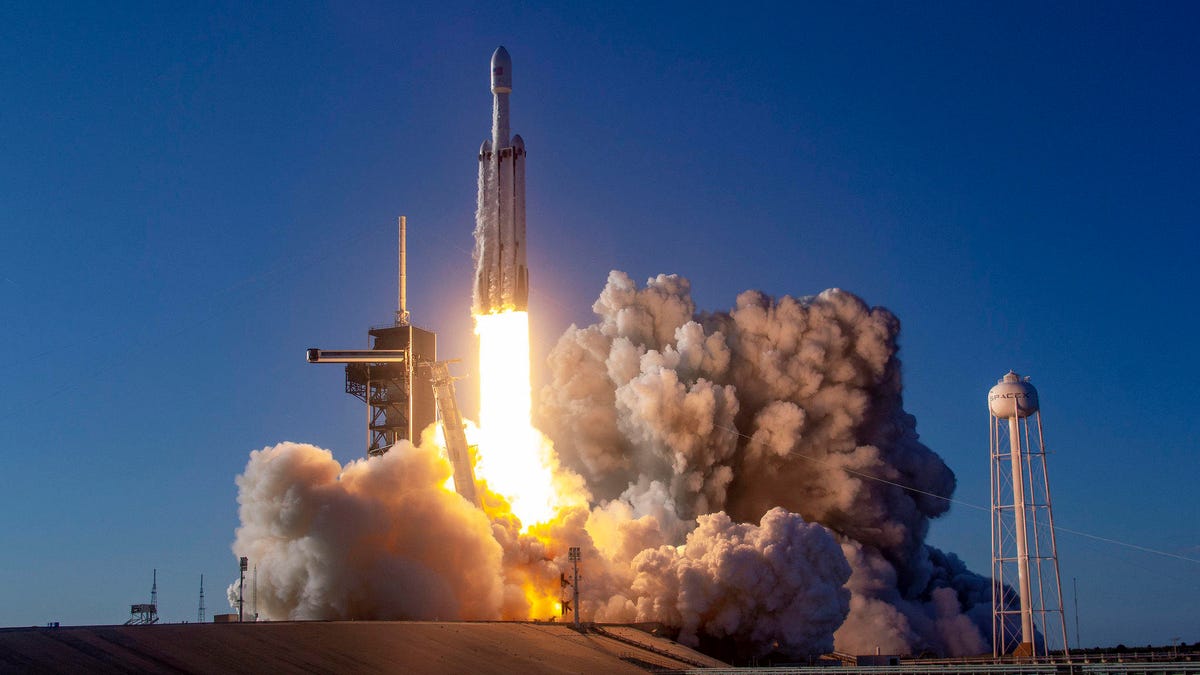Musk's SpaceX bests Bezos' Blue Origin in battle for military space launches
Blue Origin-built engines will still be in the mix, but SpaceX overcame the odds to win a big launch contract.

SpaceX Falcon 9 and Falcon Heavy vehicles will carry military satellites to orbit.
After years of battling for the right to launch military payloads for the US government, Elon Musk's SpaceX was officially awarded a contract from the Space Force for at least one confirmed launch in 2022 and an undetermined number of missions between then and 2026.
The US Space Force Space and Missiles System Center and the National Reconnaissance Office announced Friday that both SpaceX and United Launch Alliance (a joint venture between Boeing and Lockheed Martin) have been awarded phase two contracts for national security space launch services (NSSL), with ULA to provide 60 percent of launches over the period and SpaceX launching the remaining 40 percent of missions.
The Pentagon estimates that it could require more than 30 launches over that five-year period, according to CBS News. The Space Force also announced it has already ordered two launches from ULA for the fourth quarter of the 2022 fiscal year and one from SpaceX for the same period. ULA has been awarded $337 million for 2022 launch dates and SpaceX gets $316 million. Details are sparse as the launches are for national security missions.
SpaceX and ULA beat out Northrop Grumman and Jeff Bezos' Blue Origin, which also submitted bids for the contracts. Blue Origin doesn't totally lose out, however, as it will be supplying the engines for ULA rockets in the future.
The contract is a major vindication for SpaceX and Musk, who have sued the military at least twice after being shut out of previous rocket development and launch contracts. SpaceX eventually dropped a lawsuit in 2015 after the Air Force awarded a launch contract to ULA through a bidding process Musk's company claimed unfairly favored the legacy launch provider.
Then last year, it was revealed that SpaceX had sued again over the phase one NSSL contracts, which awarded money to help companies develop the rockets that they would use to apply for the phase two contracts to actually perform launches.
Blue Origin, Northrop Grumman and ULA were all given phase one money, while SpaceX was left out -- reportedly because some of the funds would be used to further development of the company's next-generation Starship, prompting the government to deem the SpaceX proposal to be the "highest risk," according to court documents.
While SpaceX has continued to argue for a share of that development funding, it submitted a proposal for the phase two launch contract and now has beat out Blue Origin and Northrop Grumman despite missing out on the extra cash that those companies had been granted.
In a statement, Blue Origin said it was "disappointed in the decision" of the Space Force to opt for SpaceX Falcon rockets over its nascent New Glenn system. Bezos' company added that it's "very proud that our BE-4 engine will power United Launch Alliance's Vulcan launch vehicle in support of the Space Force's NSSL program."
Similarly, Northrop Grumman said: "We are disappointed by this decision. We are confident we submitted a strong proposal that reflected our extensive space launch experience."
Correction: Details about the number of launches ordered and contracts associated with them have been corrected.

